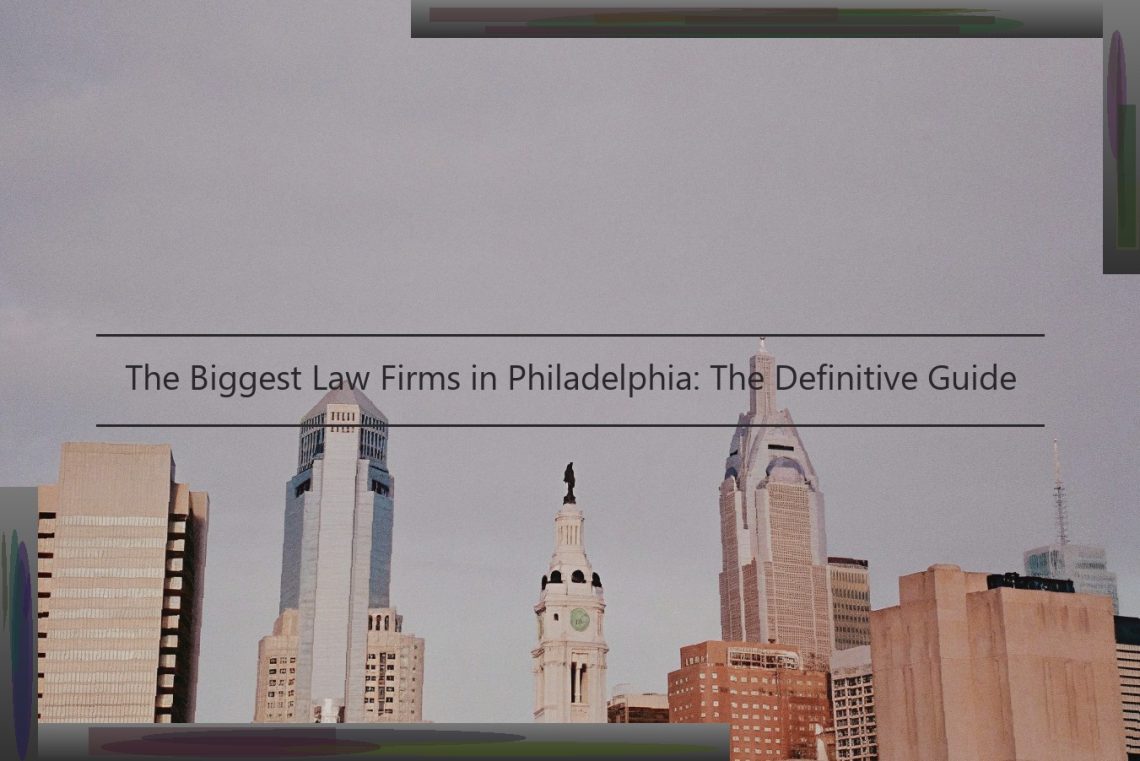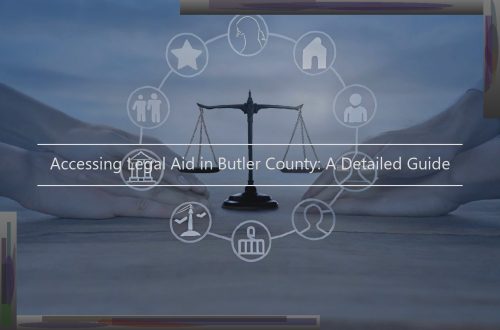
The Biggest Law Firms in Philadelphia: The Definitive Guide
A Brief Overview of the Philadelphia Legal Market
The legal market in Philadelphia is a complex and competitive landscape, marked by an extensive history that has shaped its evolution into the center of big law in the city. Established in the 18th century as a key hub for commerce and politics, Philadelphia’s legal community quickly emerged as a driving force in the development of American jurisprudence. Over the years, it has remained a constant presence amidst the city’s growth, thriving along with the city itself. As the city expanded, so did its need for legal expertise, and the early 20th century saw a surge in the number of large law firms establishing themselves in the area.
The legal market in Philadelphia is relatively stable compared to other major cities such as New York and Washington, D.C., where the competition is fierce and regulations are stricter. Philadelphia, with its unique set of challenges, has managed to cultivate a robust legal community that is home to some of the largest law firms in the country. The city is particularly known for its strong legal market in the pharmaceutical, intellectual property, and general business sectors, making it an attractive destination for big law firms looking to establish operations in the northeast region of the country. Although it may not boast the same number of firms or attorneys as larger cities , the quality of legal services available in Philadelphia is on par with those of other top-tier legal centers. Los Angeles, San Francisco, and Boston, for instance, also have their own sets of distinct features that make them attractive to legal talent and firms.
There are several factors that make Philadelphia a prominent hub for big law firms, the first of which is its strategic location. Situated at the crossroads of New York City and Washington, D.C., the city is well positioned to service the legal needs of clients in all three major northeast metropolitan areas. Additionally, Philadelphia has a highly educated and diverse population, which makes for a dynamic workforce and client base. Lastly, the city’s rich cultural history serves as a constant reminder of its historic significance, which in turn contributes to the overall appeal of living and working in the area.
The Philadelphia legal market is a vibrant and competitive environment, with an extensive history that continues to shape its present-day operations. The quality of legal services, coupled with its affordability and central location, makes Philadelphia a prime destination for many of the largest law firms in operation.
The Top Law Firms in Philadelphia
Morgan Lewis is a massive firm when it comes to law firms in Philadelphia with offices across the United States. It is specializes in intellectual property, commercial matters, tax, and litigation. Morgan Lewis has worked on high profile cases like representing Merck & Co., Inc. on its $3.8 billion deal to purchase record label Warner Music Group. This firm has also assisted clients like Microsoft, The Bank of New York Mellon Corporation, Chanel, Halliburton, and Dunkin Donuts.
Drinker Biddle & Reath LLP is also a mammoth law firm in Philadelphia working in a number of areas including litigation, insurance, intellectual property, labor & employment, corporate and securities, commercial real estate, and business and financial services. Notable clients include The William Penn Foundation, The Philadelphia Foundation, The O’Bannon Group, MullinTBG, Brandywine Realty Trust, The Ryland Group, Houlihan Lokey Howard & Zukin Capital, and Abington Memorial Hospital.
Duane Morris LLP is an up and coming large law firm in Philadelphia with regional offices as well. It specializes in real estate transactions, corporate law, intellectual property, labor & employment, litigation of many kinds, public finance, healthcare and pharmaceutical practice, tax, and advertising law. Notable clients include Biogen Idec, Bioveris, Dignity Health, ArcelorMittal Energy, Santaris Pharma, and TorreyPines.
Blank Rome LLP is another large law firm in the city specializing in maritime, Admiralty, government contracts, and real estate law. Blank Rome has represented Arma Global Corp, Northrop Grumman Corp., and Tyco International Ltd.
How to Select a Law Firm in Philadelphia
In our guide, we explore how to find the top big law firms in Philadelphia. We look at firms with a reputation for high-quality legal work.
When choosing a law firm in Philadelphia, potential clients or lawyers may consider factors such as the firm’s reputation, practice areas, and client reviews. Reputation may be based on the firm’s history, its standing with legal organizations or trade groups, or its ranking in industry publications. Potential clients may also seek information from local referral services or from people who have previously used the services of a law firm.
Potential clients may also be concerned with the size of the firm. Small firms may focus on a specific need such as family law or workers’ compensation. Large firms may have several areas of focus, but may also have proficiency in niche practice areas.
Lawyers may also consider a number of factors when assessing which law firm is right for them. In addition to looking at a firm’s track record and reputation, they may also assess the firm’s approach to a fair wage and ethical practices.
In addition to a reputation for high-quality legal work and experience in several areas of the law, prospective clients or lawyers may also want to know more about the firm’s culture in order to make sure that it is a good fit for their individual needs.
The Effect of Big Law Firms on the Economy of Philadelphia
In Philadelphia, Big Law firms not only add much value to their clients but also provide significant benefits to the city and its residents. Law firms are among the few professions that bring significant revenue to the city without their own proprietary product or service. These big firms add to the tax base of the city not only through their own tax payments but also through associated employment, earnings and other activity.
The strong presence of large law firms in the Philadelphia region additionally stimulates the economy by retaining high paying jobs that would be more likely to leave the area or the state if large law firms chose to relocate. Not having residents employed by large law to earn salaries well above the area median such as $135,000 per year for a 5th year associate creates both a demographic loss for the city as well as missing out on significant tax gross receipts.
Beyond revenues directly generated by law firm employment, significant economic benefits can be attributed to their high ratio of community event participation and corporate sponsorship. Large law firms are active sponsors in charitable giving. In Philadelphia, this chart shows the Philadelphia Bar Association is sponsored by more than 60 law firms, and other bar associations and legal organizations including the Pennsylvania Bar Association and the Diversity Bar Alliance each boast 10 to 30 high-end law firm sponsors.
Large law firm revenue is not limited to the firms’ own operations. The cities in which large firms operate realize additional revenue from the millions of dollars brought to the city each year by the short term corporate and organizational clients of large law when they retain law firms that are headquartered in the center city business district. By way of example, approximately 65% of the short term business of regional heavyweight Ballard Spahr comes from out of state organizations with whom they have conducted 1,000+ meetings this year — nearly half of them with New York City based businesses and City government agencies making up a substantial portion of the remainder. When a law firm among the top 100 in the nation is headquartered in Philadelphia , it is creating a healthy stream of revenue to the City’s coffers that no other type of business can replicate.
Law firms can derive substantial revenue from litigation as settlements result in large payments to a single law firm from which the City can collect substantial revenue. A vivid example that illustrates the point is the significant amount of revenue the City has received from its share of the several hundred million dollar settlement as the result of the ruling of the 3rd Circuit Court of Appeals in favor of Comcast with respect to its dispute with TVEyes. In that case, compared with the remaining years on the lease for the building in which TVEyes operated, the City received an additional $31.5 million in revenue on the last few years of field office occupancy in the class A office building at 1845 Walnut Street. That substantial income would have been lost had Comcast not won in court.
One thing is for sure, regardless of the depth of the legal market in Philadelphia, the region will most certainly attract and benefit from a very low percentage of first chair lead litigation attorneys that are employed by large law firms. An example is Charleston, SC which has a deep legal pool from which such attorneys can be recruited, including the 3rd Circuit Court of Appeals in which the City of Philadelphia and its School District play a central role in the court’s docket. With more than several dozen offices occupied by large law where the City of Charleston is not the primary client location, the client base is very thin and the ability to win major litigation cases is spread across many smaller firms.
Large law firms do not attract significant revenue to a city by merely employing people. There are additional economic benefits provided by law firms. The firms’ business development and marketing needs require recruiting and employing the types of professionals and service providers that add significantly to the city’s tax base.
Trends and Innovations in Philadelphia Law
Among the top legal trends is the move towards technology and how that is benefitting not just the firms, but their customers. No legal practice has resisted applying technology and automation to its business model more than large law, with the increasing pressure on partners to increase billable hours in exchange for the pay raises they expect. Automation and the legal tech age are adding to efficient practices, improving the quality of services provided to clients, and are attracting talented new lawyers who expect tech to support them in a way that is second nature.
Litigation support teams in larger law firms have been under pressure to make the lawyer’s life easier and help prepare them for cases using analytical tools and data analytics with software. This data driven approach has rattled the lawyers in these firms who have not found themselves in paid in order to make. Using tools like Linklaters’ LINK platform, large law firms provide their lawyers with on-demand access to standard-form precedents, legal research , and analytical tools. Other large law firms have introduced digital tools and interfaces to allow attorneys to engage in paralegal work right from their phones.
Artificial intelligence is another major leap for big law. The reality is that not everyone is keen on AI, particularly at larger law firms. Sceptics of AI and machine learning are often the ones who will be looking for the next job if they are replaced by a robot. On the flip side, everyone has made mistakes that can be avoided using the accuracy of AI. Legal analytics are one marked way that AI is being used to automate document review, elimination of routine tasks such as drafting contracts, creating plaintiff profiles, and briefing experts. Combined with other corporate functions, AI will gives lawyers room to embrace a different way of working.
More than any other place in the world, Philadelphia is holding a significant amount of legal innovations. Law firms in Philadelpia have an opportunity to be at the front of a revolution with a higher earning power in a higher quality of life.




